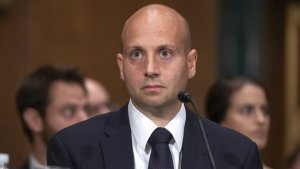His departure means that SEC Commissioner Hester Peirce will likely be by herself carrying the torch in the fight against the SEC’s hostility toward the digital asset space.


The outcome of the SEC v. Ripple lawsuit is expected to serve as precedent for future regulatory enforcement actions and court rulings in the United States.
Ripple Labs and individual defendants Chris Larsen and Brad Garlinghouse have made efforts to show the court led by Magistrates Sarah Netburn and Analisa Torres that the SEC has failed to prove fair notice in accordance with US securities laws.
Hester Peirce aka ‘Crypto Mom’ now goes it alone
The Securities and Exchange Commission itself has shown along the way a number of moves that may be perceived as contradictory.
Besides that, the very idea that the agency hasn’t provided regulatory clarity for market participants can weigh on the potential settlement deal between both parties or the verdict made by the court.
On that, it is widely known within the industry that two of the five current SEC Commissioners have been stones in Chair Gary Gensler’s shoe. These two officials are Hester Peirce and Elad Roisman.
Elad Roisman, however, has just announced his intent to depart the SEC.
“Serving the American people as a Commissioner and an Acting Chairman of this agency has been the greatest privilege of my professional life. It has been the utmost honor to work alongside my extraordinary SEC colleagues, who care deeply about investors and our markets.”
His departure means that SEC Commissioner Hester Peirce will likely be by herself carrying the torch in the fight against the “SEC’s hostility” toward the digital asset space, as Ripple put it.
FinanceFeeds webinar: Expert panel to discuss market data for multi-asset brokerages
In July 2021, Peirce and Roisman made a joint statement commenting on a court ruling of a crypto case and they took the opportunity to criticize the SEC’s regulation-by-enforcement practice.
The bombshell statement includes key quotes such as:
- “Although the commission has provided some guidance, the large number of factors cut against the clarity the guidance was intended to offer.”
- “People can study the specific cases but “applying those clues to the facts of a completely different token offering does not necessarily produce clear answers.”
- “[P]roviding clear regulatory guideposts and then bringing enforcement actions against people who ignore them is a better approach than the clue-by-enforcement approach that we have embraced to date and that today’s settlement embodies.”
Prior to that, Peirce had proposed a sandbox for the crypto ecosystem under which network developers would be exempt for three years from the registration provisions of federal securities laws, during which time they would be allowed to launch their products and develop their networks through token transactions.
If “network maturity” has been achieved at the conclusion of the three-year period, token transactions would not trigger securities registration requirements, under SEC Peirce’s proposal.
Ripple embraced the sandbox idea and defended it in Congress last month. “The current uncertainty in the U.S. regulatory landscape discourages innovation and could cause a “brain drain” in the cryptocurrency and blockchain space. In order to incentivize innovation and inform the development of a clear and consistent regulatory framework for cryptocurrencies, we believe innovation sandboxes should be encouraged.”.




